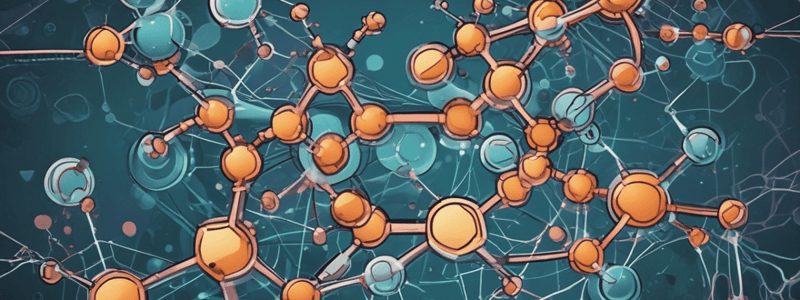Podcast
Questions and Answers
What is the steady-state assumption for an intermediate in a series of reactions?
What is the steady-state assumption for an intermediate in a series of reactions?
- Its rate of ES synthesis is greater than its rate of ES degradation.
- Its rate of ES synthesis is independent of its rate of ES degradation.
- Its rate of ES synthesis is lower than its rate of ES degradation.
- Its rate of ES synthesis is equal to its rate of ES degradation. (correct)
What is the unit of the Michaelis constant Km?
What is the unit of the Michaelis constant Km?
- min^-1
- mmol/min
- L:min^-1
- mmol/L (correct)
What is the significance of a low Km value?
What is the significance of a low Km value?
- The enzyme is inhibited by substrate.
- The enzyme has high affinity for its substrate. (correct)
- The enzyme is saturated with substrate.
- The enzyme has low affinity for its substrate.
What is the maximum velocity of an enzyme-catalyzed reaction denoted by?
What is the maximum velocity of an enzyme-catalyzed reaction denoted by?
What is the Michaelis-Menten equation?
What is the Michaelis-Menten equation?
At what substrate concentration is the velocity of an enzyme-catalyzed reaction half of its maximum velocity?
At what substrate concentration is the velocity of an enzyme-catalyzed reaction half of its maximum velocity?
What is the effect of increasing substrate concentration on the reaction rate?
What is the effect of increasing substrate concentration on the reaction rate?
Why does the velocity of the reaction fail to increase with further increase in substrate concentration beyond Vmax?
Why does the velocity of the reaction fail to increase with further increase in substrate concentration beyond Vmax?
What is the condition under which the rate of formation of ES is equal to the rate of breakdown of ES?
What is the condition under which the rate of formation of ES is equal to the rate of breakdown of ES?
What is the relationship between the concentration of substrate and the concentration of enzyme in an enzyme-catalyzed reaction?
What is the relationship between the concentration of substrate and the concentration of enzyme in an enzyme-catalyzed reaction?
What determines the rate of the reaction at fixed enzyme concentration and varying substrate concentration?
What determines the rate of the reaction at fixed enzyme concentration and varying substrate concentration?
What is the effect of a lower free energy of activation on the rate of the reaction?
What is the effect of a lower free energy of activation on the rate of the reaction?
What is the primary function of enzymes in the body?
What is the primary function of enzymes in the body?
What is the energy barrier separating the reactants and the products called?
What is the energy barrier separating the reactants and the products called?
What is the role of the enzyme in catalyzing a reaction?
What is the role of the enzyme in catalyzing a reaction?
What is the term for the enzyme-substrate complex?
What is the term for the enzyme-substrate complex?
What is the mechanism by which enzymes stabilize the transition state?
What is the mechanism by which enzymes stabilize the transition state?
What is the assumption that the rate of formation of the enzyme-substrate complex is equal to the rate of its breakdown?
What is the assumption that the rate of formation of the enzyme-substrate complex is equal to the rate of its breakdown?
What is the equation that describes the kinetics of enzyme-catalyzed reactions?
What is the equation that describes the kinetics of enzyme-catalyzed reactions?
What is the term for the state in which the enzyme is fully bound to substrate?
What is the term for the state in which the enzyme is fully bound to substrate?
Flashcards are hidden until you start studying
Study Notes
Enzyme Kinetics
- An intermediate in a series of reactions is said to be in steady state when its rate of synthesis is equal to its rate of degradation.
- The Michaelis constant (Km) is the substrate concentration required to achieve 50% of the maximum velocity of the enzyme.
- Km is a measure of the substrate concentration at which an enzyme achieves half of its maximum reaction velocity (Vmax) when operating at saturating substrate concentrations.
Significance of Km
- Km reflects the affinity of an enzyme for its substrate.
- A low Km value indicates high affinity, meaning the enzyme can achieve half-maximal velocity at relatively low substrate concentrations.
- A high Km value indicates low affinity, requiring higher substrate concentrations to reach half-maximal velocity.
- Km values can provide insights into the substrate specificity of enzymes.
Rate of Reaction
- For molecules to react, they must contain sufficient energy to overcome the energy barrier of the transition state.
- The lower the free energy of activation, the more molecules have sufficient energy to pass through the transition state, and therefore, the faster the rate of the reaction.
- The rate of reaction is affected by substrate concentration, with velocity increasing until it reaches a maximum value (Vmax) and then plateauing.
Enzyme-Saturation
- When substrate concentration increases, velocity (vi) increases until it reaches Vmax, at which point the enzyme is said to be "saturated" with the substrate.
- At saturating conditions, vi depends solely on the rapidity with which product dissociates from the enzyme, allowing it to combine with more substrate.
Steady-State Assumption
- The steady-state assumption is that the rate of formation of ES is equal to that of the breakdown of ES (to E + S and to E + P).
- [ES] does not change with time, meaning the rate of ES synthesis is equal to its rate of degradation.
Enzyme Kinetics and Regulation
- Enzymes are protein catalysts that increase the rate of reactions without being changed in the overall process.
- Virtually all reactions in the body are mediated by enzymes.
- Kinetics is the study of the factors that influence reaction rates.
Energy Changes during the Reaction
- Virtually all chemical reactions have an energy barrier separating the reactants and the products.
- The energy barrier, called the free energy of activation, is the energy difference between the reactants and a high-energy intermediate that occurs during the formation of product.
- The enzyme does not change the free energies of the reactants or products, but accelerates the rate by which equilibrium is reached.
Catalytic Efficiency of Enzymes
- Factors responsible for the catalytic efficiency of enzymes include:
- Transition-state stabilization: By stabilizing the transition state, the enzyme greatly increases the concentration of the reactive intermediate that can be converted to product.
- Other mechanisms: The active site can provide catalytic groups that enhance the probability that the transition state is formed.
- Visualization of the transition state: The enzyme-catalyzed conversion of substrate to product can be visualized as a process similar to removing a sweater from an uncooperative infant.
Studying That Suits You
Use AI to generate personalized quizzes and flashcards to suit your learning preferences.




